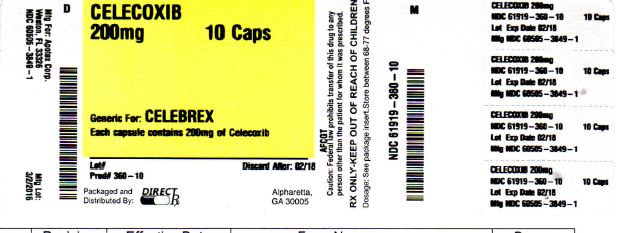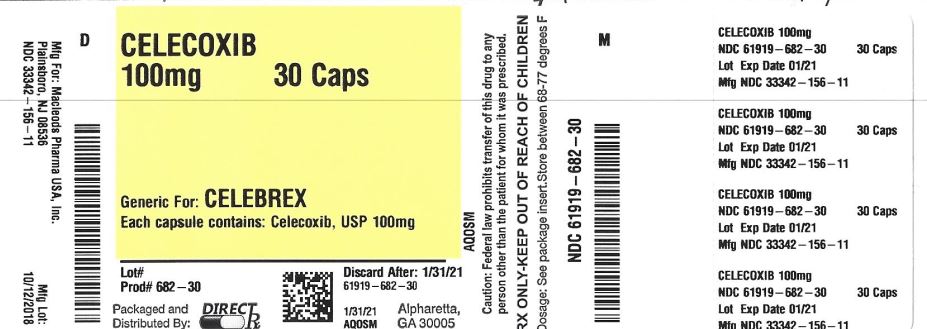CELECOXIB by Direct_Rx CELECOXIB capsule
CELECOXIB by
Drug Labeling and Warnings
CELECOXIB by is a Prescription medication manufactured, distributed, or labeled by Direct_Rx. Drug facts, warnings, and ingredients follow.
Drug Details [pdf]
- ADVERSE REACTIONS
- STORAGE AND HANDLING
-
MEDICATION GUIDE
Medication Guide for Nonsteroidal Anti-inflammatory Drugs (NSAIDs)
What is the most important information I should know about medicines called Nonsteroidal Anti-inflammatory Drugs (NSAIDs)?
NSAIDs can cause serious side effects, including:Increased risk of a heart attack or stroke that can lead to death. This risk may happen early in treatment and may increase:
o with increasing doses of NSAIDs
o with longer use of NSAIDs
Do not take NSAIDs right before or after a heart surgery called a “coronary artery bypass graft (CABG)."Avoid taking NSAIDs after a recent heart attack, unless your healthcare provider tells you to. You may have an increased risk of another heart attack if you take NSAIDs after a recent heart attack.
Increased risk of bleeding, ulcers, and tears (perforation) of the esophagus (tube leading from the mouth to the stomach), stomach and intestines:
o anytime during use
o without warning symptoms
o that may cause death
The risk of getting an ulcer or bleeding increases with:o past history of stomach ulcers, or stomach or intestinal bleeding with use of NSAIDs
o taking medicines called “corticosteroids”, “anticoagulants”, “SSRIs” or “SNRIs”
o increasing doses of NSAIDs o older age
o longer use of NSAIDs o poor health
o smoking o advanced liver disease
o drinking alcohol o bleeding problemsNSAIDs should only be used:
o exactly as prescribed
o at the lowest dose possible for your treatment
o for the shortest time neededWhat are NSAIDs?
NSAIDs are used to treat pain and redness, swelling, and heat (inflammation) from medical conditions such as different types of arthritis, menstrual cramps, and other types of short-term pain.
Who should not take NSAIDs?
Do not take NSAIDs:
if you have had an asthma attack, hives, or other allergic reaction with aspirin or any other NSAIDs.
right before or after heart bypass surgery.
Before taking NSAIDS, tell your healthcare provider about all of your medical conditions, including if you:have liver or kidney problems
have high blood pressure
have asthma
are pregnant or plan to become pregnant. Talk to your healthcare provider if you are considering taking NSAIDs during pregnancy. You should not take NSAIDs after 29 weeks of pregnancy
are breastfeeding or plan to breast feed.
Tell your healthcare provider about all of the medicines you take, including prescription or over-the-counter medicines, vitamins or herbal supplements. NSAIDs and some other medicines can interact with each other and cause serious side effects. Do not start taking any new medicine without talking to your healthcare provider first.What are the possible side effects of NSAIDs?
NSAIDs can cause serious side effects, including:
See “What is the most important information I should know about medicines called Nonsteroidal Anti-inflammatory Drugs (NSAIDs)?
new or worse high blood pressure
heart failure
liver problems including liver failure
kidney problems including kidney failure
low red blood cells (anemia)
life-threatening skin reactions
life-threatening allergic reactions
Other side effects of NSAIDs include: stomach pain, constipation, diarrhea, gas, heartburn, nausea, vomiting, and dizziness.Get emergency help right away if you get any of the following symptoms:
shortness of breath or trouble breathing slurred speech
chest pain swelling of the face or throat
weakness in one part or side of your bodyStop taking your NSAID and call your healthcare provider right away if you get any of the following symptoms:
nausea vomit blood
more tired or weaker than usual there is blood in your bowel movement or it is black and sticky like tar
diarrhea unusual weight gain
itching skin rash or blisters with fever
your skin or eyes look yellow swelling of the arms, legs, hands and feet
indigestion or stomach pain
flu-like symptomsIf you take too much of your NSAID, call your healthcare provider or get medical help right away.
These are not all the possible side effects of NSAIDs. For more information, ask your healthcare provider or pharmacist about NSAIDs. Call your doctor for medical advice about side effects. You may report side effects to FDA at 1-800-FDA-1088.
Other information about NSAIDs
Aspirin is an NSAID but it does not increase the chance of a heart attack. Aspirin can cause bleeding in the brain, stomach, and intestines. Aspirin can also cause ulcers in the stomach and intestines.
Some NSAIDs are sold in lower doses without a prescription (over-the counter). Talk to your healthcare provider before using over-the-counter NSAIDs for more than 10 days.General information about the safe and effective use of NSAIDs
Medicines are sometimes prescribed for purposes other than those listed in a Medication Guide. Do not use NSAIDs for a condition for which it was not prescribed. Do not give NSAIDs to other people, even if they have the same symptoms that you have. It may harm them. If you would like more information about NSAIDs, talk with your healthcare provider. You can ask your pharmacist or healthcare provider for information about NSAIDs that is written for health professionals.
For more information, call at 1-888-943-3210.
This Medication Guide has been approved by the U.S. Food and Drug Administration.
Manufactured for :
Macleods Pharma USA, Inc.
Plainsboro, NJ 08536Manufactured by :
Macleods Pharmaceuticals Ltd.
Baddi, Himachal Pradesh, INDIARevision Date: May 2016
PM02159404 -
88436-1 - Section Title Not Found In Database
Advise the patient to read the FDA-approved patient labeling (Medication Guide) that accompanies each prescription dispensed. Inform patients, families, or their caregivers of the following information before initiating therapy with celecoxib capsules and periodically during the course of ongoing therapy.
Cardiovascular Thrombotic Events
Advise patients to be alert for the symptoms of cardiovascular thrombotic events, including chest pain, shortness of breath, weakness, or slurring of speech, and to report any of these symptoms to their health care provider immediately [see Warnings and Precautions (5.1)].Gastrointestinal Bleeding, Ulceration, and Perforation
Advise patients to report symptoms of ulcerations and bleeding, including epigastric pain, dyspepsia, melena, and hematemesis to their health care provider. In the setting of concomitant use of low-dose aspirin for cardiac prophylaxis, inform patients of the increased risk for and the signs and symptoms of GI bleeding [see Warnings and Precautions (5.2)].Hepatotoxicity
Inform patients of the warning signs and symptoms of hepatotoxicity (e.g., nausea, fatigue, lethargy, pruritus, diarrhea jaundice, right upper quadrant tenderness, and “flu-like” symptoms). If these occur, instruct patients to stop celecoxib capsules and seek immediate medical therapy [see Warnings and Precautions (5.3), Use in Specific Populations (8.6)].Heart Failure and Edema
Advise patients to be alert for the symptoms of congestive heart failure including shortness of breath, unexplained weight gain, or edema and to contact their healthcare provider if such symptoms occur [see Warnings and Precautions (5.5)].Anaphylactic Reactions
Inform patients of the signs of an anaphylactic reaction (e.g., difficulty breathing, swelling of the face or throat). Instruct patients to seek immediate emergency help if these occur [see Contraindications (4) and Warnings and Precautions (5.7)].Serious Skin Reactions
Advise patients to stop celecoxib capsules immediately if they develop any type of rash and to contact their healthcare provider as soon as possible [see Warnings and Precautions (5.9)].Female Fertility
Advise females of reproductive potential who desire pregnancy that NSAIDs, including celecoxib capsules, may be associated with a reversible delay in ovulation [see Use in Specific Populations (8.3)].Fetal Toxicity
Inform pregnant women to avoid use of celecoxib capsules and other NSAIDs starting at 30 weeks of gestation because of the risk of the premature closing of the fetal ductus arteriosus [see Warnings and Precautions (5.10) and Use in Specific Populations (8.1)].Avoid Concomitant Use of NSAIDs
Inform patients that the concomitant use of celecoxib capsules with other NSAIDs or salicylates (e.g., diflunisal, salsalate) is not recommended due to the increased risk of gastrointestinal toxicity, and little or no increase in efficacy [see Warnings and Precautions (5.2) and Drug Interactions (7)]. Alert patients that NSAIDs may be present in “over the counter” medications for treatment of colds, fever, or insomnia.Use of NSAIDS and Low-Dose Aspirin
Inform patients not to use low-dose aspirin concomitantly with celecoxib capsules until they talk to their healthcare provider [see Drug Interactions (7)].Manufactured for :
Macleods Pharma USA, Inc.
Plainsboro, NJ 08536Manufactured by :
Macleods Pharmaceuticals Ltd.
Baddi, Himachal Pradesh, INDIARevision Date: October 2018
- PRINCIPAL DISPLAY PANEL
-
INGREDIENTS AND APPEARANCE
CELECOXIB
celecoxib capsuleProduct Information Product Type HUMAN PRESCRIPTION DRUG Item Code (Source) NDC: 61919-682(NDC:33342-156) Route of Administration ORAL Active Ingredient/Active Moiety Ingredient Name Basis of Strength Strength CELECOXIB (UNII: JCX84Q7J1L) (CELECOXIB - UNII:JCX84Q7J1L) CELECOXIB 100 mg Inactive Ingredients Ingredient Name Strength POVIDONE (UNII: FZ989GH94E) SODIUM LAURYL SULFATE (UNII: 368GB5141J) HYDROXYPROPYL CELLULOSE (1600000 WAMW) (UNII: RFW2ET671P) TITANIUM DIOXIDE (UNII: 15FIX9V2JP) GELATIN (UNII: 2G86QN327L) FD&C BLUE NO. 2 (UNII: L06K8R7DQK) LACTOSE MONOHYDRATE (UNII: EWQ57Q8I5X) MAGNESIUM STEARATE (UNII: 70097M6I30) CROSPOVIDONE (15 MPA.S AT 5%) (UNII: 68401960MK) PROPYLENE GLYCOL (UNII: 6DC9Q167V3) Product Characteristics Color white Score no score Shape CAPSULE Size 14mm Flavor Imprint Code C5;100mg Contains Packaging # Item Code Package Description Marketing Start Date Marketing End Date 1 NDC: 61919-682-30 30 in 1 BOTTLE; Type 0: Not a Combination Product 09/18/2019 Marketing Information Marketing Category Application Number or Monograph Citation Marketing Start Date Marketing End Date ANDA ANDA204590 04/04/2019 CELECOXIB
celecoxib capsuleProduct Information Product Type HUMAN PRESCRIPTION DRUG Item Code (Source) NDC: 61919-360(NDC:60505-3849) Route of Administration ORAL Active Ingredient/Active Moiety Ingredient Name Basis of Strength Strength CELECOXIB (UNII: JCX84Q7J1L) (CELECOXIB - UNII:JCX84Q7J1L) CELECOXIB 200 mg Inactive Ingredients Ingredient Name Strength DIMETHICONE (UNII: 92RU3N3Y1O) FERRIC OXIDE YELLOW (UNII: EX438O2MRT) ISOPROPYL ALCOHOL (UNII: ND2M416302) BUTYL ALCOHOL (UNII: 8PJ61P6TS3) GELATIN (UNII: 2G86QN327L) SHELLAC (UNII: 46N107B71O) ALCOHOL (UNII: 3K9958V90M) MAGNESIUM STEARATE (UNII: 70097M6I30) SODIUM LAURYL SULFATE (UNII: 368GB5141J) TITANIUM DIOXIDE (UNII: 15FIX9V2JP) POVIDONE (UNII: FZ989GH94E) AMMONIA (UNII: 5138Q19F1X) PROPYLENE GLYCOL (UNII: 6DC9Q167V3) CROSPOVIDONE (UNII: 68401960MK) Product Characteristics Color white Score no score Shape CAPSULE Size 18mm Flavor Imprint Code APO;C200 Contains Packaging # Item Code Package Description Marketing Start Date Marketing End Date 1 NDC: 61919-360-10 10 in 1 BOTTLE; Type 0: Not a Combination Product 03/02/2016 2 NDC: 61919-360-15 15 in 1 BOTTLE; Type 0: Not a Combination Product 03/02/2016 Marketing Information Marketing Category Application Number or Monograph Citation Marketing Start Date Marketing End Date ANDA ANDA204197 03/02/2016 Labeler - Direct_Rx (079254320) Registrant - Direct_Rx (079254320) Establishment Name Address ID/FEI Business Operations Direct_Rx 079254320 repack(61919-360, 61919-682)
© 2026 FDA.report
This site is not affiliated with or endorsed by the FDA.

